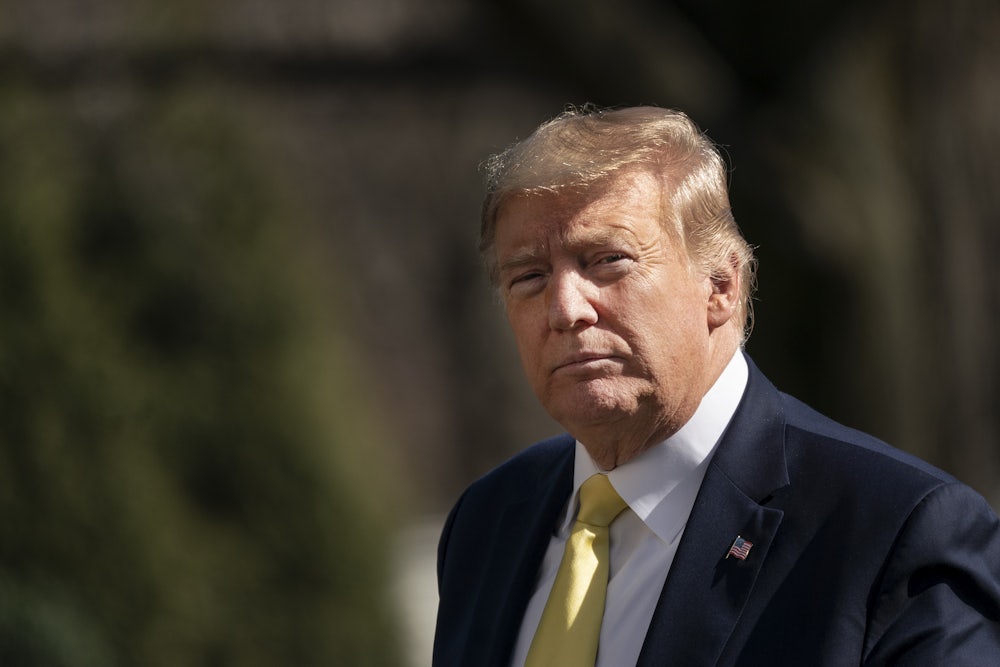We are in the midst of several overlapping crises. The United States is clearly unprepared for coronavirus, which is rapidly spreading. The economy is buckling under the strain: The long bull market is over, and a recession seems inevitable. And all of this is being exacerbated by the unending political crisis that is the Trump presidency. Everything that the president has said and done has reeked of desperation and has had the opposite of its intended effect: People are panicking, the economy is tanking, and there is little faith that Trump is capable of managing the situation.
This has, not without reason, led many to conclude that this is the crisis that will finally do Trump in. A massive global shockwave is on the verge of overwhelming our craven and incompetent president and sweeping him from power. On Sunday, CNN’s Chris Cillizza mused that coronavirus may very well be “Trump’s Katrina,” writing, “Moments like this one—when the entire country is looking to its President for leadership, stability and, most importantly, facts—are a high-wire act for an administration. Fall down on the job here, and there may be no recovery.” In The Atlantic, David Frum argued that Trump will undoubtedly be held responsible for his administration’s myriad failings: “He owns responsibility for those things. He cannot escape it, and he will not escape it.”
The idea that Trump is a kind of political Icarus, doomed to fall, is integral to the way many in the media perceive him. Predictions of his demise have dogged Trump from the very start of his political career. These predictions involve the American people waking up from their stupor to finally see the light. And yet, despite being exposed over and over, Trump is still here. In fact, just before falling down on the job yet again, he was arguably as popular as he had ever been. This moment may very well spell the end of the Trump presidency, but recent history should give the prophets of Trump’s downfall pause.
Throughout the 2016 election, pundits consistently predicted that Trump was finished. They did so after his racist announcement that all Mexicans are “rapists.” After he trashed John McCain and George W. Bush. After he made misogynistic comments about then-Fox News host Megyn Kelly. After he responded to terror attacks by demanding that America ban Muslims and “bomb the shit” out of ISIS. Trump easily glided to the nomination—and then narrowly won an election nearly everyone in the media was certain he would lose.
Trump’s presidency has also been beset with predictions of imminent collapse. They followed practically every twist and turn of the Russia investigation, from revelations that Trump had instructed campaign officials to make contact with Russian intelligence to the firing of James Comey. When Trump pressured the president of Ukraine to investigate Joe Biden—leading House Democrats to, at long last, impeach him—the soothsayers came out again. As recently as January, people were declaring that we had finally reached the point of no return, with Trump blundering his way into a disastrous war with Iran.
For the last three years, we have been living with a sense that the other shoe is about to drop—that the president will do something so crass or foolish that it will sever his connection to the voters who adore him and the Republican officials who have coddled him. That shoe hasn’t dropped.
There are, to be sure, good reasons to more or less continually call curtains for this president. His first term in office has been a cavalcade of scandals, any one of which could have easily felled another president. The unofficial rulebook of presidential conduct suggests that no president should be able to behave the way that this one does and get away with it. And yet! Trump’s shamelessness has perversely aided him. Pundits are Janus-faced, looking backward to make predictions about the future, a hindrance in a moment when all of the supposed rules of political life have been thrown out the window.
He has used the politics of the moment—negative partisanship, in the parlance of political science—as armor, blaming the Democrats and the media for things that are obviously his fault. Pundits waiting for the bottom to finally fall out show that they still don’t understand what motivates Trump’s base, which is hatred for the other side.
There is an element of wishful thinking, as well. There is hope that we will, maybe next week even, wake up from this terrible dream and that things will go back to “normal.” This fantasy is seemingly motivating many Democratic voters, who have lined up behind Joe Biden on the promise that he can magically unwind the Trump presidency. But there is no sign that a sizable minority of the country has any interest in unwinding anything that has happened during this administration.
The coronavirus may well be the moment that all changes. Trump has been a remarkably fortunate president, inheriting a roaring economy. Most of the major issues he has had to deal with have been of his own making—by historical standards, he has faced relatively few outside challenges. That is now changing very rapidly. Everything we have seen over the past month affirms that he is perhaps the worst person imaginable to deal with this crisis: an economic recession brought about by a global pandemic. But while the word “resilient” certainly doesn’t apply to the president, he is a political cockroach who has shown an ability to survive in hostile conditions. Those in the media who are ready to bury him yet again should think twice.
